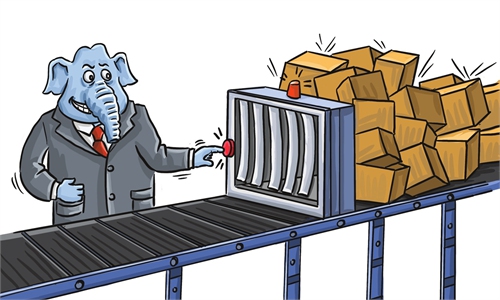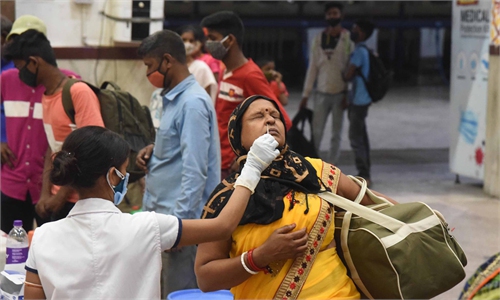Be wary of India’s provocation amid worsening pandemic

Illustration: Xia Qing/GT
As the COVID-19 epidemic continues to worsen in India, the country may turn to old tricks, such as initiating provocations on its borders with China or Pakistan, fanning nationalist sentiments at home, to distract people's attention.Indian Ambassador to China Vikram Misri said on April 15 that sweeping the border issue under the carpet and characterizing it as a "minor issue" is "tantamount to running away from the problem," according to media reports.
Based on New Delhi's prior patterns, every time when there is a vital crisis at home, India has always tried to distract attention by stirring up trouble on external issues, such as border issue. Tensions on China-India border have been relieved to some extent, but China needs to maintain sharp vigilance and get ready to deal with potential fresh moves by India at the border.
India's COVID-19 epidemic has experienced a serious second wave. Its daily new COVID-19 cases have shockingly exceeded 200,000 for seven consecutive days. In one crematorium in the western Indian state of Gujarat, gas and firewood furnaces have been running so long without breaks that metal parts have begun to melt, according to CNN. Considering India's 1.36-billion population and inadequate medical system, this new wave has made India a new epicenter.
British Prime Minister Boris Johnson on Monday canceled his visit to India. The UK has also added India to a "red list" of countries from which most travel to the UK is banned. The US Center for Disease Control has issued a warning for potential travelers to India, asking them to "avoid all travel" to the country even they are fully vaccinated.
The new wave has made people suspect that the Indian government's early case data may be fake - misguiding the public that the country has successfully contained the epidemic in order to lift the lockdown early. India's recent large scale gatherings have been held on schedule, including election rallies, sporting events and religious festivals. The Indian government and people's awareness of epidemic prevention has gradually loosened. They lifted previous control measures too early. This should be one of the important factors that led to the new outbreak.
Pressed by shortage of funding and raw materials, India's own vaccine production capacity is also limited. India is facing huge pressure on medical personnel, vaccine storage and vaccine transportation, making it difficult to effectively promote vaccination.
India's epidemic mismanagement may impact the country's internal affairs and diplomacy. In a bid to gain more support in the state assembly election, Indian politician elites are busy passing the buck of their mishandling of the disease. Local authorities have attacked the central government's ineffectiveness in preventing and controlling the epidemic, while the latter accuses the former of negligence. They dim the current focus in the fight against COVID-19. If the spread of the virus continue to speed up, Indian politicians may remain on the same page to hype their agenda against China to reduce domestic pressure.
Viruses know no borders or nations. At the initial stage of the outbreak, India lent China a helping hand during a critical period fighting the disease. When the epidemic severely spread in India, China in kind provided assistance within its capacity.
Against the backdrop of the pandemic deteriorating, New Delhi should open its mind and figure out a way to get Beijing's help to curb the grave spread of the disease. China should respond to India's appeal, maintain high-level communications, and step up exchanges of experience on epidemic prevention and control. It is of great significance to the world for China and India to strengthen solidarity and cooperation to overcome the pandemic as soon as possible.
The author is head of the Department for Asia-Pacific Studies at China Institute of International Studies. opinion@globaltimes.com.cn



